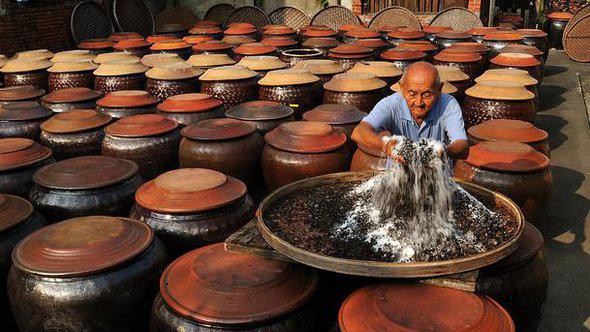The sauce is thick and sticky.
丁國云醬料粘稠、厚重。
Workers have to stir it with a fixed schedule to ensure fermentation takes place evenly within the jar.
需要人力定時的上下翻動,醬缸內的發酵才會均勻。
And within the jar, the micro-organisms restrict one another.
在這些醬缸里微生物的世界,
One kind's loss is another's gain.
互相制約,此消彼長。
The jars have been through many repairs during the past several decades.
醬缸修修補補,用了幾十年。
The direct exposure in the sun can greatly stimulate the vitality of yeasts.
陽光的暴曬能夠激發菌的活力。
But rain might mess things up.
但是雨水可能會搞砸一切。

Time slips always in the repeated sound of the lids of the jars being moved away and put back.
醬缸的帽子,不時被拿下來,扣上去,仁昌醬園時間就在這反復的聲響里流走。
The sauce of China started a trend in human being's history of fermentation.
中國的醬在人類的發酵史上獨樹一幟。
Several thousand years have passed and it has become a fundamental flavor on dining tables in China.
數千年間,它成就了中國人餐桌上味道的基礎。
In North China, the meaning of sauce is more straightforward.
在中國的北方,醬的意味更加直接。
Only a little paste is left in the jar of Wang Yueying's.
王月英家的醬缸里,只剩下一層缸底。
Enough salt ensures that Wang Yueying the sauce won't get frozen in severe winter.
足夠的鹽度王月英讓醬在嚴寒中也不容易結凍。
In chilly northeast China, for quite a long time, salt in the form of sauce has provided physical and psychological support for people.
在寒冷的東北,長久以來鹽以醬的形式成為人們身體和心理的一種依靠。
Three months later, it'll be time to make new soybean paste.
再過三個月就是下新醬的時候了。
But the preparation work shall start now.
但是準備的工作卻要從現在開始。
The cooked soybeans are smashed in the pot.
煮熟的黃豆在鍋里直接被搗爛。
In northeast China, soybean is the only ingredient for making sauce.
在中國的東北地區人們做醬只用大豆這一種材料。
The monopoly is also a luxury.
這樣的單一也是一種奢侈。
Heilongjiang Province boasts the most fertile black soil in China,
黑龍江,有中國最肥沃的黑土地-黑龍江,
The farming and harvest here is short and hasty.
依蘭縣-這里的耕種和收獲急促而短暫。
But the place produces the best soybeans.
卻能出產最好的大豆。











